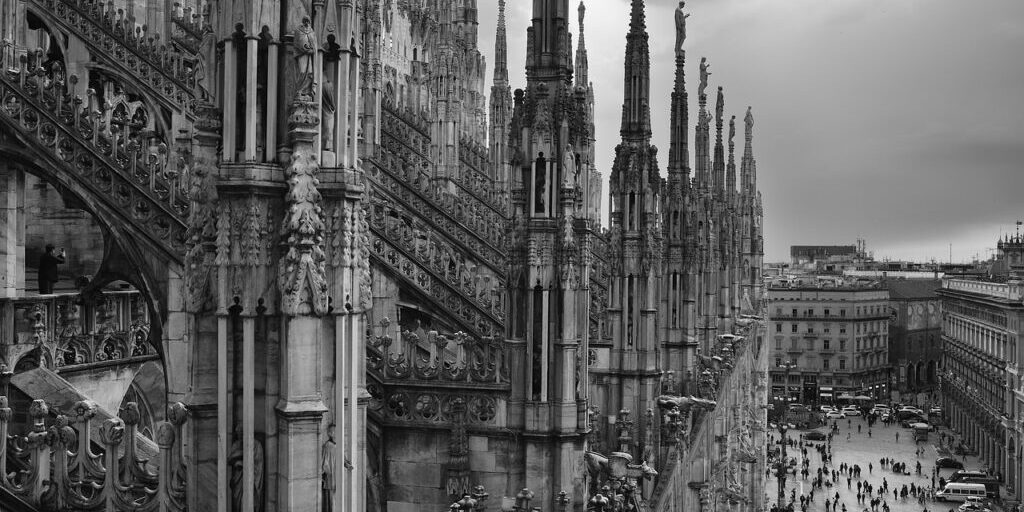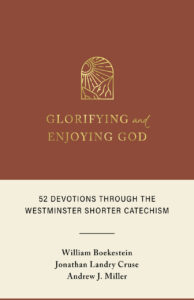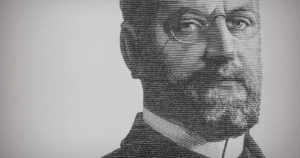
We are made to know God
W e are made to know God (Phil. 3:10). As we form friendships, even among equals, we come to know who our friends are and what they do. So it is as we grow in a loving relationship with the One who is our King, our Father, and our Friend. God is a being perfect in all His attributes. One of God’s attributes is His power. That God is powerful presupposes that He works. Growing in understanding of God’s works will help us better know God.
e are made to know God (Phil. 3:10). As we form friendships, even among equals, we come to know who our friends are and what they do. So it is as we grow in a loving relationship with the One who is our King, our Father, and our Friend. God is a being perfect in all His attributes. One of God’s attributes is His power. That God is powerful presupposes that He works. Growing in understanding of God’s works will help us better know God.
The seventeenth century Westminster Shorter Catechism speaks of God’s work of creation and providence as the execution of what theologians call “the decrees of God.”[i] God makes and maintains all things that have been, are now, and will ever be.
The Facts about God’s Decrees
In simple terms God’s decrees are His “one comprehensive plan” that cannot be thwarted.[ii] Knowing that God is working out His plan can be a great comfort to people whose lives seldom work out as they had imagined.
God Foreordains Whatever Comes to Pass
God has a purpose that He works out in all things “according to the counsel of His will” (Eph. 1:11). In Isaiah 46 the Lord puts on notice those who follow false gods. Idols are impotent. Don’t miss Isaiah’s searing mockery: “From its place it shall not move. Though one cries out to it, yet it cannot answer nor save him out of his trouble” (v. 7). God is different. He declares the end from the beginning. Before anything happens, God has ruled it to be so. “My counsel shall stand, and I will do all My pleasure.… I have spoken it; I will also bring it to pass. I have purposed it; I will also do it” (vv. 10–11). Whatever God wants happens. Not even Satan can act apart from God’s permission (Job 1:12).We are made to know God. Click To Tweet
God has decreed everything that comes to pass “for his own glory,” His own honor, dignity, and reputation. If that sounds selfish, remember that the human drive for praise is poisoned by sin and a yearning to take what we do not deserve. But God cannot sin and is truly worthy of all glory (Rev. 4:11). Creatures cannot take credit for the good we do. The best human works are community projects. Exquisite paintings are influenced by artists’ teachers and painted on canvases made by others. But as “the Beginning and the End” (Rev. 21:6), there is no one with whom God can share the credit for creation and providence. Even creaturely good works glorify the goodness of the Creator (Matt. 5:16). And God glorifies Himself in the best possible way. The path to human greatness is inescapably paved with fortuitous miscalculations and the deliberate mistreatment of others. But God is glorified by the “wise, free, and holy acts of the counsel of his will.”[iii] God never sins that good may come of it.
God’s Decrees Reflect His Perfection
The Westminster Larger Catechism beautifully links God’s decrees to such divine perfections as wisdom, freedom (or might), holiness, eternality, and unchangeableness. Because God is wise, His works reflect His wise plan. “The Lord by wisdom founded the earth; by understanding He established the heavens” (Prov. 3:19). Many of our decisions are nearly accidents. We combine limited knowledge, mixed intentions, and meager strength, and we hope for the best. Unlike us, God doesn’t deliberate between options, finally settling on His best bet. He knows with infallible understanding.Because God is free, His hand is never forced. Click To Tweet
Because God is free, His hand is never forced. God is sovereign, “free and independent of any force outside of himself to accomplish his purposes.”[iv] He never makes a decision under duress. God counsels Himself (Rom. 11:34–35; Eph. 1:11) and performs what He wills. God, without the slightest stress, has already decreed the outcomes of even the decisions we make under pressure.
Because God is holy, He never decrees incorrectly. We compromise. God never does. We will not always like what happens in our lives or in the world around us. But we can believe that God is running the world well. In holiness God decreed to allow the fall and subsequent sin. As with God’s decree to crucify Jesus, so too His purpose in allowing sin is holy. The second person of the Trinity willingly and deliberately lived out God’s decree to suffer for our salvation. His pain was redemptive; so is the pain of believers. This is a mystery to us.[v] But we can be confident that all things will result in God’s glory and the restoration of the elect.
Because God is eternal and unchangeable, His decrees “are not successively formed as the emergency arises, but are all parts of one all-comprehending plan.”[vi] “Known to God from eternity are all His works” (Acts 15:18).
The Beauty of God’s Decrees
Psalm 3 describes one of the worst relational disasters we can imagine. King David’s son Absalom turned against him. He so threatened David’s reign that David narrowly escaped the city with only a few loyal friends. As David fled, a man named Shimei cursed him, slandered his character, and assaulted him with stones. David’s friend Abishai indignantly pleaded: “Please, let me go over and take off his head!” (2 Sam. 16:9). Here is David’s response: “Let him alone, and let him curse; for so the Lord has ordered him. It may be that the Lord will look on my affliction, and that the Lord will repay me with good for his cursing this day” (vv. 11–12). David used God’s divine decrees to find peace in a hard place. This painful experience didn’t happen by chance. God ordered it. The abuse heaped on David didn’t mean he was worthless. It meant that God’s good plan for a man He loved required this hard ordeal.Knowledge of God’s decrees can free us from the dominion of negative emotions. Click To Tweet
Knowledge of God’s decrees can free us from the dominion of negative emotions. In our anxiety the future seems scary. Understanding God’s decrees enables us to trust Him even for the future we can’t control. In our shame we feel uncomfortably self-conscious about what we have done or have had done to us. But in union with Jesus—who experienced the shameful death of the cross for us—we can believe that “as the sufferings of Christ abound in us, so our consolation also abounds through Christ” (2 Cor. 1:5). In our frustration we feel dissatisfied because of unfulfilled needs or unresolved problems. But believing in God’s decrees convinces us that “Whoever believes on Him will not be put to shame” (Rom. 10:11). If we feel stuck in God’s story, it is because we have lost sight of what we already know about what God has written: all things work out well for His children (Rom. 8:28–30).
God’s decrees can even motivate our obedience. That God’s decrees are unchangeable might seem to suggest that our choices don’t matter. It is just the opposite! The choices we make are how we experience what God has decreed for us. By the law and gospel, God obliges us to use the means that He has ordained for the accomplishing of His purposes.[vii] Believing in Christ means participating in His death and resurrection. For Christ, glory came through suffering. He walked the path of death because He was confident of being raised up in newness of life (Heb. 12:2). So must we. God has decreed His will, which He shall surely do. He has also made “known to us the mystery of His will, according to His good pleasure which He purposed in Himself, that…He might gather together in one all things in Christ” (Eph. 1:9–10). Because we believe that God’s plan is good, we can faithfully walk in the footsteps of our Savior’s path.
This post is adapted from Glorifying and Enjoying God: 52 Devotions through the Westminster Shorter Catechism (Reformation Heritage), by William Boekestein, Jonathan Landry Cruse, and Andrew J. Miller
Endnotes
[i] See Westminster Shorter Catechism, Q/A 7, 8.
[ii] Louis Berkhof, Systematic Theology (Grand Rapids: Eerdmans, 1939), 102.
[iii] Westminster Larger Catechism, Q/A 12.
[iv] Joel R. Beeke, Living for God’s Glory: An Introduction to Calvinism (Lake Mary, Fla.: Reformation Trust, 2008), 39.
[v] Berkhof explains the paradox like this: God “renders the future sinful act absolutely certain, but [He] determines (a) not to hinder the sinful self-determination of the finite will; and (b) to regulate and control the result of this
sinful self-determination” (Systematic Theology, 105).
[vi] Charles Hodge, Systematic Theology, vol. 1, Theology (Grand Rapids: Eerdmans, 1975), 537.
[vii] Berkhof, Systematic Theology, 107.

